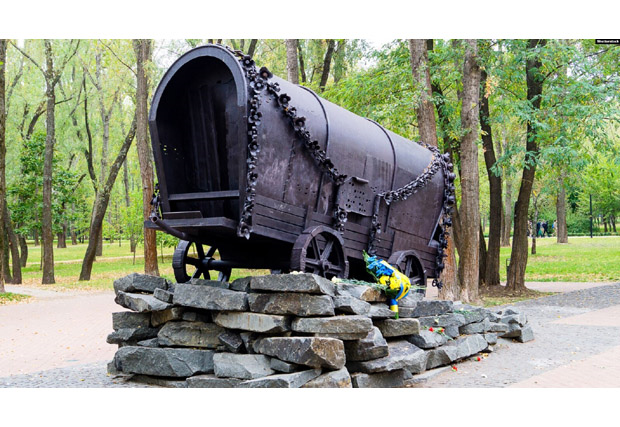The Roma Holocaust Memorial Day
 Today, on 2 August, the whole world commemorates the victims of the Nazi genocide of the Roma. It was on the night of 2 to 3 August 1944 that the Nazis murdered more than 4,000 Roma prisoners in the Auschwitz-Birkenau death camp in Poland.
Today, on 2 August, the whole world commemorates the victims of the Nazi genocide of the Roma. It was on the night of 2 to 3 August 1944 that the Nazis murdered more than 4,000 Roma prisoners in the Auschwitz-Birkenau death camp in Poland.
Roma were subjected to stigmatisation and restrictions long before the National Socialist dictatorship. The Nazis took these prejudices to extremes. The genocide began after the Nazis came to power, with the gradual isolation of Roma and the deprivation of their rights and means of livelihood. As a result of the Nuremberg Laws of 1935, marriages between Germans and so-called "outsiders" were banned.
In the same year, Roma in large cities began to be forcibly relocated to "Gypsy camps". A decree of the Kriminalpolizei of 8 December 1938 stated that it was necessary to "finally resolve the Gypsy question", which stemmed "from the very nature of this race".
In 1943, more than 22,000 Roma from Germany and some other European countries were deported to Auschwitz. About 19,300 people died there from starvation, cold, diseases, exhaustion, medical experiments, or were sent to the gas chambers.
In his publications and interviews, Mykhailo Tiaglyy notes that it is difficult to calculate the exact number of victims among the Roma population in Ukraine during the Second World War. According to his estimates, the total number of Roma killed on the present-day territory of Ukraine is approximately 25,000, although this number could be much higher. Ukraine was then divided into several spheres of influence: most of it was under German occupation, some was subordinated to Romania, and a small area belonged to the Hungarians (from publications by Mykhailo Tiaglyy, researcher at the Ukrainian Center for Holocaust Studies https://www.radiosvoboda.org/.../pid-chas.../31386887.html)
You can learn more about the genocide of Roma in Nazi-occupied Ukraine on our website https://www.holocaust.kiev.ua/Files/News/ukraine_kyr.pdf
Announcements
MoreLatest News
-
Bulletin «Lessons of the Holocaust», № 4 (84), 2025
Dear colleagues! The fresh issue of information-pedagogical bulletin of UCHS «Lessons of the Holocaust», № 4 (84), October-December, 2025 has been published.
[More] -
(No) Children’s Stories Exhibition in Odesa
Starting the year with a powerful event - from January 19 to 30, 2026, Odesa will host the exhibition (No) Children’s Stories for the first time.
[More] -
Bibliographic Database “Jewish Studies in Independent Ukraine”
The Ukrainian Association for Jewish Studies has begun work on a project to create a bibliographic database entitled Jewish Studies in Independent Ukraine. The project envisages the creation of a reference resource covering various types of academic publications, as well as dissertations and educational publications
[More] -
Happy New Year 2026 from the Ukrainian Center for Holocaust Studies!
2025 was a year of action and partnerships. With our team and partners, we made many meaningful initiatives possible.
[More] -
The Formation of Holocaust Scholarly Discourse in European Nations
On December 16, 2025, the State Institution Institute of World History of the National Academy of Sciences of Ukraine held the International Scientific Conference The Formation of Holocaust Scholarly Discourse in European Nations.
[More]




